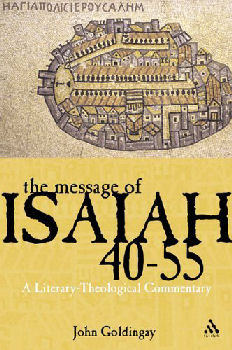
|
Posted April 27, 2006
Book: The Message of Isaiah 40-55: A Literary - Theological Commentary Author: John Goldingay T & Clark International, New York, 2005, pp.578 An Excerpt from the Jacket:
The prophet eventually becomes aware of a distinctive personal calling to embody that response, until the people are ready to do this (notwithstanding the suffering it brings) that embodies the kind of ministry that needs to be exercised to them so that they may be brought back to God and find a restoration of spirit, as well as physical restoration. An Excerpt from the Book: Listen, Obstinate Jaacob (48. 1-11) “Listen to this, house of Jacob, people who called yourselves by the name Israel, who came out of the waters of Judah; who swear by the name Yhwh, who invoke the God of Israel – not in truth and not in rightness. So each of the subsections opens in a relatively positive way. Yet once again, to tell people to listen is inclined to presuppose a disinclination to pay heed to whatever will follow. This is more explicit if paradoxical when the command is addressed to the (perversely) strong-minded or the blind and deaf. Similar considerations apply to the singular exhortation to Jacob in 44.1; 48.12 and to Babylon in 47.8, the plural “listen to this” of 4816 (cf. Also v. 14?), the ‘give ear to this’ of 42.23 and ‘think about this’ of 46.8. the fact that the last ‘listen to this’ was the one addressed to Ms Babylon in particular (see 47.8) makes this a slightly worrying introduction. It hints that for the community the warning to Babylon is double-edged. It might suggest good news for them, but it might also bring their own warning. The confrontation that is already thus presaged is also hinted at in the usual initial address to them as ‘Jacob’, a title that points to the empirical community in its down-to-earth humanness, dispirited and depressed. They called themselves ‘Israel’ (the verb is niphal not pual), but were they entitled to do so? Table of Contents Part I Introduction 1. Introduction 2. Yhwh is returning to Jerusalem 3. Yhwh the Creator has Jacob-Israel’s destiny in hand Part II Yhwh’s Vindication and Deliverance 4. Yhwh’s unique power and Yhwh’s commitment to servant Israel 5. Yhwh’s unique power and Yhwh’s achievement through the servant 6. Yhwh’s commitment to blind and deaf 7. Yhwh’s commitment to using Jacob-Israel as witness Part III Yhwh’s Work with Cyrus 8. The triumph of Cyrus 9. The fall of Babylon’s Gods and their cities 10. The challenge of Jacob-Israel Part IV The Servant and Zion 11. The servant’s testimony and its implications 12. Yhwh’s response to abandoned Zion 13. The awakening of Yhwh’s servant 14. The awakening of Yhwh and of Zion Part V Yhwh’s Act of Restoration and Transformation 15. Yhwh’s act of restoration and transformation 16. The fruitfulness of the servant ministry 17. The renewing of the abandoned woman’s city 18. Conclusion: the broadening of the covenant commitment |
|
